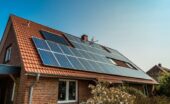The Cost Of Home Solar Panels
Written by SayBuild Administration // July 29, 2013 // Solar Energy // Comments Off on The Cost Of Home Solar Panels

Electricity is not cheap. In fact, bills seem to be rising every year in many states and people are looking for ways to escape the system. Solar panels offer a way to do just that with the added incentive of helping the environment. A lot of folks are thinking of getting into the green bandwagon but they aren’t sure how to go about it and how much it would cost them. It would be best to ask local environment protection offices but for those who are merely looking for a ballpark figure, here’s a quick rundown of the costs:
Component Costs
1. Solar Panels — The single most expensive item on the list is the panels themselves. It’s worth noting that prices have gone down considerably in the last 20 years and they continue to drop, making them more affordable for the middle class. The number of panels required will depend on the household’s energy consumption. For an average suburban home with 3 bedrooms, a 4 kiloWatt system should suffice. The usual range for residential systems is 3 to 7 kiloWatts with costs being $4,500 to 12,000.
2. Mounting Equipment — Expenses will depend on whether the panels will be directly mounted on the roof, on stands, or on rotating frames that track the movement of the sun. Panels should face south for optimum light gathering capacity. Most residential homes opt for static mounting and costs range from $800 to $2,000.
3. Power Inverter — Since the panels produce electricity in DC, an inverter is needed to convert it to AC and make the system compatible with the appliances. This also allows the system to be connected to the grid, which comes with plenty of advantages. Inverters may cost anywhere from $1,000 to $3,000.
4. Wiring — Of course, all of these individual components must be wired together in order to form a cohesive unit. The cost is non-trivial and can reach around $1,000 or more including conduits, disconnects, and wiring boxes.
Installation Costs
1. Installation Service — Primarily concerned with the cost of labor and perhaps some equipment if the roof is hard to reach. Smaller systems, which require few panels are easier to install, especially if they will simply be placed on a roof deck. Panels in multiple arrays are more difficult to configure, more so if they have to be mounted on high slanted roofs. Installation can thus range from $2,000 to $4,000.
2. Local Permits — Local governments have to be informed about the installation and other fees must be paid before the go signal can be given. These so-called "soft costs" can go from $3,000 to $6,000.
Savings
1. Government Aid — It’s evident that the costs can escalate pretty quickly but fortunately, the federal government has stepped in to assist people by providing as much as 30% in rebates. Some local governments also have their own tax incentives and rebate programs. The combined effect of these is to slash the costs to nearly half of the original estimate. That’s a substantial reduction that should help a lot of folks to push through with their solar panel project.
2. Electricity Savings — Assuming that the system installed produces adequate electricity for the household, then the monthly energy bill should plummet down to zero. In fact, plenty of systems generate electricity in excess and this can be fed into the grid in exchange for payment from the utility company. So not only will this make households independent producers of electricity, it may also provide them with extra income.
Rate of Return
Solar panel installation is an investment that will pay for itself in savings after a number of years. The initial cost and the amount of sunlight in the area will affect the rate of return. It could be as long as 20 years or as short as 7 years.
Author Bio
William Stevens is a writer who creates informative articles in relation to technology. In this article, he describes the finances surrounding solar panels and aims to encourage further study through Ohio University Civil Engineering Master’s Programs.








 If you want to contribute tutorials, news or other money-related stuff:
If you want to contribute tutorials, news or other money-related stuff:  Share our home building library with your facebook friends:
Share our home building library with your facebook friends:  Do you have any ideas or suggestions you would like to make?
Do you have any ideas or suggestions you would like to make?  If you like what we do, please subscribe to our
If you like what we do, please subscribe to our  All content Copyright © 2012 SayBuild. Part of nBuy Home Management Network.
All content Copyright © 2012 SayBuild. Part of nBuy Home Management Network.